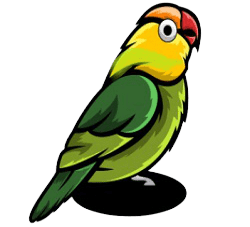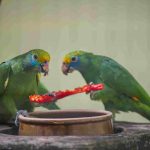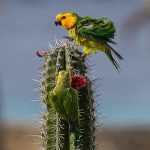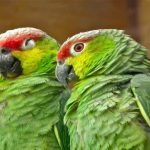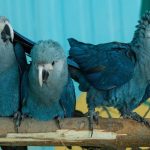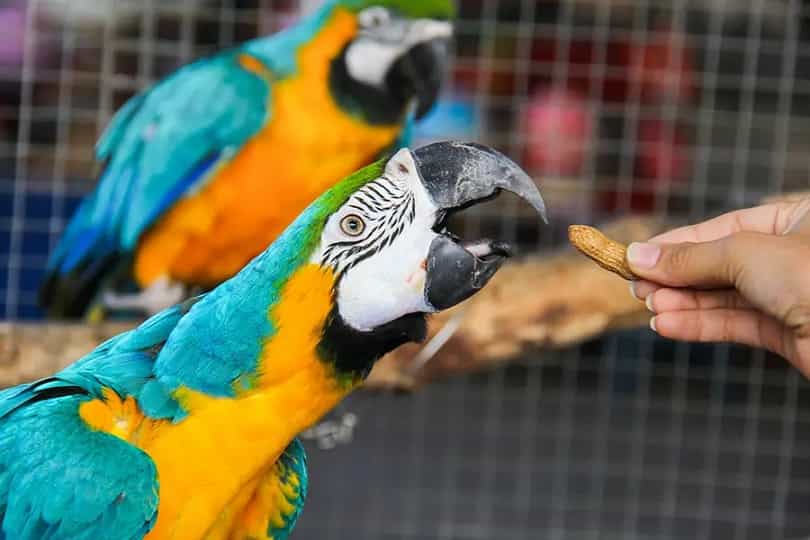
Parrots, with their vibrant colors and exceptional intelligence, captivate the hearts of many bird enthusiasts. These fascinating creatures have specific dietary needs that are vital for their well-being and longevity. Understanding their nutritional requirements is key to providing optimal care for your parrot. Let’s delve deeper into what parrots eat and uncover some additional considerations that are important for their diet.
What Do Parrots Eat?
Parrots are omnivores, meaning they consume a wide range of foods from both plant and animal sources. The foundation of a parrot’s diet consists of fresh fruits and vegetables, which provide essential vitamins, minerals, and antioxidants. Fruits like apples, bananas, oranges, grapes, melons, and berries offer a colorful and flavorful array of options for your parrot’s palate. Vegetables such as carrots, broccoli, leafy greens, peppers, and peas are rich in nutrients and add variety to their meals. It’s recommended to offer a diverse selection of fruits and vegetables to ensure a well-rounded nutritional intake.
- Fresh fruits and vegetables are the foundation of a parrot’s diet. They provide essential vitamins, minerals, and antioxidants. Some fruits that are safe and nutritious for parrots include apples, bananas, oranges, grapes, melons, and berries. When it comes to vegetables, offer a variety such as carrots, broccoli, leafy greens, peppers, and peas. Aim to provide a mix of different colors to ensure a broad spectrum of nutrients.
- In addition to fruits and vegetables, parrots also benefit from consuming seeds and nuts. These provide healthy fats, protein, and essential minerals. Popular seed choices include sunflower, pumpkin, flax, and sesame seeds. Nuts like almonds, walnuts, pistachios, and cashews are also suitable for parrots. However, it’s crucial to offer them in moderation due to their high-fat content. As with any food, make sure the seeds and nuts are fresh and free from mold.
- Parrots are known for their strong beaks, which are designed to crack open hard shells. Therefore, incorporating some foods with shells or husks into their diet can be beneficial. Examples include uncooked whole grains like brown rice, quinoa, millet, and barley. These grains provide carbohydrates, fiber, and additional nutrients. You can also offer small amounts of sprouted grains for added variety and nutritional value.
- While a healthy diet is essential, it’s equally important to avoid feeding your parrot foods that can be harmful or toxic. Some foods to steer clear of include avocado, chocolate, caffeine, alcohol, onions, garlic, and high-sugar or high-salt items. These foods can cause digestive issues, liver problems, or even be fatal to parrots. It’s always best to research specific foods before introducing them into your parrot’s diet.
Points to Remember
- Parrots require fresh fruits and vegetables for essential vitamins and antioxidants.
- Offer a variety of fruits like apples, bananas, oranges, grapes, melons, and berries.
- Provide vegetables such as carrots, broccoli, leafy greens, peppers, and peas.
- Seeds like sunflower, pumpkin, flax, and sesame provide healthy fats and minerals.
- Nuts like almonds, walnuts, pistachios, and cashews should be given in moderation.
- Incorporate uncooked whole grains like brown rice, quinoa, millet, and barley for fiber and carbohydrates.
- Avoid toxic foods like avocado, chocolate, caffeine, alcohol, onions, garlic, and high-sugar or high-salt items.
It’s important to note that different species of parrots may have specific dietary preferences and requirements. Consult with an avian veterinarian or an avian nutritionist to get personalized advice for your parrot’s species and individual needs. They can guide you in creating a well-rounded diet that promotes optimal health and happiness for your feathered friend.
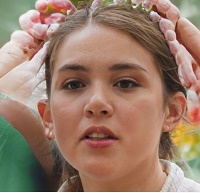
Bird Enthusiast
Masters in Counseling & Data Sciences
University of Maryland
Professional Parrots, Pigeons Breeder and Keeper
